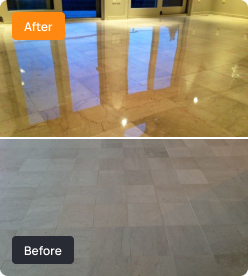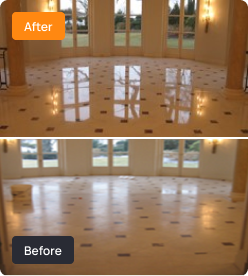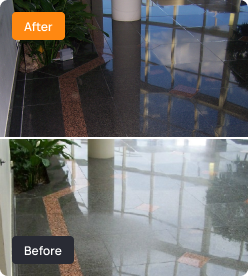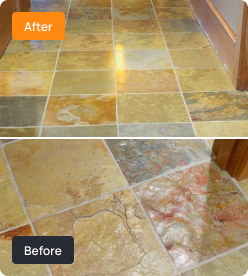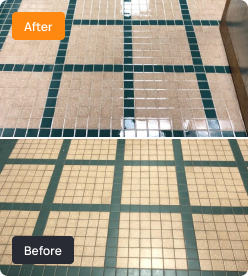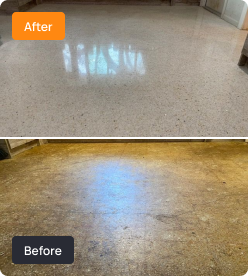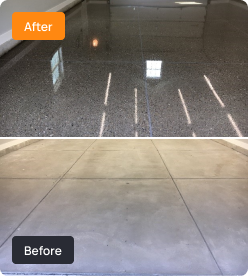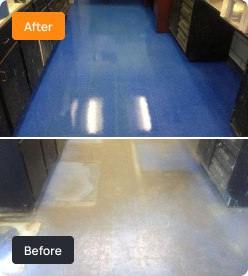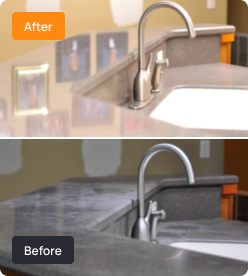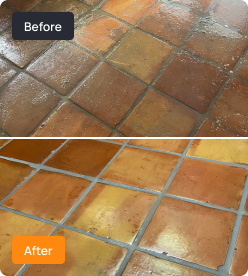How to Properly Clean Different Countertop Types without Doing Damage. Do you have the Right Products?
Walk into any kitchen showroom, and you will find an astounding variety of kitchen countertops made from different natural stones. Whether you choose marble, granite, travertine, quartz, or wood, each has its selling points and cleaning and maintenance requirements. Hence, you must consider all the factors before purchasing a stone countertop. Your kitchen countertop material […]
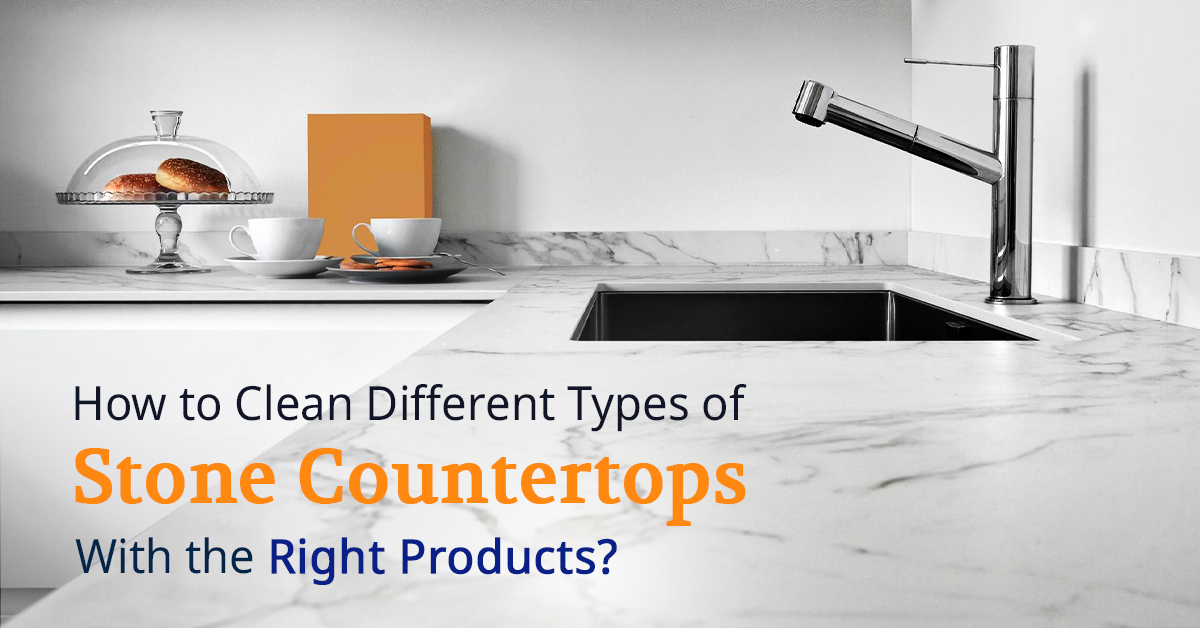
Walk into any kitchen showroom, and you will find an astounding variety of kitchen countertops made from different natural stones. Whether you choose marble, granite, travertine, quartz, or wood, each has its selling points and cleaning and maintenance requirements. Hence, you must consider all the factors before purchasing a stone countertop.
Your kitchen countertop material should complement your interiors, but it must be practical too. Taking proper measures is necessary to keep any surface looking clean. And if you want your kitchen countertop to appear like new for a prolonged time, you will have to prevent scratches and intense heat exposure.
Though countertops made from natural stones lend a luxurious vibe to the interiors, maintaining them is quite simple, IF you know what you are doing, however improper care can have expensive consequences, so pay attention to the DON’Ts as well as the DOs’. In this blog, you can find easy tips to keep your countertops in top-notch condition using common ingredients found in every kitchen.
- GRANITE
- QUARTZ
- MARBLE
- ENGINEERED STONE (Zodiac and Silestone)
- CORRIAN
- TILE
- METAL
Marble Countertops
Marble countertops may come at a high price but also ooze glamor and luxury. Keeping this sensitive material in all its brand-new glory can be difficult if you are not careful with selecting the right cleaning products.
Marble is super sensitive to acidic liquids, like lemon juice and vinegar. Even a tiny droplet can dissolve an etch mark into the surface of your stone countertops. You cannot clean away an etch, it must be polished out, as such no cleaner will remove this mark. If you leave your marble, travertine, limestone or concrete countertops exposed to acids, they will be spotted, dulled and damaged. Granite on the other hand is tailor made for use in the kitchen due to its acid resistant nature. Spill away without concern you are a wipe away from restoring clean. Spill salad dressing on your marble counter and it is marked for life … or until you arrange to have it repolished again.
Cleaning
- Be sure surface is sealed to ensure dirt, oils and debris remain on the surface where you can wipe them away. Fail to seal and suffer a stain and it will be followed by an expensive stain removal surface.
- Use aa non-acidic, wax-free, oil-free, scent-free emulsifying surfactant based cleaner to clean your marble and granite countertop daily. Formulated to remove everything for a true clean, free of streaks, or build-up.
- Wipe it using a microfiber towel or cloth or paper towel for best results.
- MYTH 1: Soap and Water will not etch marble, but are also not designed to provide a streak-free finish, or to neutralize acidic residues. Do no damage does not equate with provide best result.
- MYTH 2: Do Not Clean with Vinegar -Avoid using acidic cleaners (pH below 7) or “natural” cleaners such as vinegar. Acidic compoundsDissolve CaCO3 based natural stones surfaces such as marble limestone and travertine eand manmade surfaces such as concrete. This can appear as white spots, rings, or spill marks that just will not go away. No cleaner can remove a hole.
- MYTH 3: Glass Cleaners or All-Purpose Cleaners are fine – These cleaners generally incorporate waxes to provide a gloss designed to fill in microscratches on glass exteriors but unnecessary and longterm dulling for marble and granite surfaces as they build-up and hide the natural beauty under a layer of wax build-up. If you have a cleaner that is designed to leave-something-behind how can it claim to clean the surface? By definition it is planning to leave something behind, and that something can and will trap dirt.
For best results, use the cleaner formulated based on 30-years of field experience restoring countertops and the cleaning errors that damaged them/// MARBLELIFE MARBLE & TRAvERTINE READY-TO-USE CLEANER or MARBLELIFE GRANITE & QUARTZ CLEANER . are designed specifically for marble, limestone, and travertine countertops and granite and quartz countertops respectively. Formulated to emulsify, lift and remove oil, grease and dirt quickly and effectively for a streak free, cleaned surface.
Sealing
Sealing is essential in maintaining the surface of natural stone countertops, even though they are known for their sturdiness and durability. Sealers provide additional protection against staining, but traditional penetrating sealers may be susceptible to damage from acidic materials. Suppose you have used vinegar to clean your surface. In that case, you may need to reseal it, as spills from acidic substances like lemon spritz or vinegar-based salad dressing can damage the seal in the spill area.
It is best to reseal marble countertops at least once a year using MARBLELIFE Stone Sealer. This product is easy to use with a wipe-on. Wait 5 minutes to soak in and wipe off the excess. Simply wipe it on, and then wipe off any excess after 5 minutes, and that’s it.
A seal keeps spills on the counter, making them easy to clean. Failure to reseal may result in a stubborn stain that may be impossible to remove. You have invested significant money, time, and effort in selecting and installing your stone, and you surely don’t want to go through that again.
Stain Removal
Use baking soda and water paste for oil-based stains on marble countertops. For water-based stains, you can use hydrogen
peroxide. Apply the paste on the spot and cover it with plastic wrap. Tape down the edges. Leave it for a few days, and then rinse it off. Repeat the process if the stain persists. Effective stain removal depends on using a liquid that can dissolve the specific staining material, which may vary depending on the source of the stain. However, it is essential to note that there is no foolproof method to remove every stain.
Note: Do a spot test first to ensure that it does not affect the color or finish of the stone.
Quartz Countertops
Famous for their durability and non-porous surface, Quartz countertops come in several colors, from bright whites to cool grays, rich browns, and blacks.
While some quartz countertops have veining that makes them look like marble, other options come with mirror chips that reflect light and give them a sparkling appearance.
Cleaning
Unlike marble, maintaining quartz is not hard. The crystal structure of quartz comes tightly packed, resulting in a non-porous composition. It does not absorb or allow water, liquids, or other substances to pass through it easily. You can wash Quartz kitchen countertops with a non-acidic cleaner such as MARBLELIFE GRANITE & QUARTZ CLEANER, which effectively and quickly lifts and emulsifies oils for a quick, easy, streak-free shine.
Stain Removal
Quartz countertops are largely stain-resistant and durable, but you should clean them regularly. If you spot a stain that is hard to remove, even with soap and water, follow the guidance above for marble counters.
Sealing
Quartz countertops don’t need any resealing because of their non-porous structure to stay pristine.
Granite Countertops
Granite countertops dominate the market for good reason offering an acid resistant surface that is durable as it is beautiful. Maintaining it is simply a case of ensuring it is sealed to keep any kitchen or bathroom spills up on top of the surface where it is easy to clean up, and using a quality unscented, wax-free, oil-free emulsifying cleaner.
Granite slabs come in different colors and patterns. As granite countertops are porous, they are prone to stains and quickly absorb liquids. Fortunately, products like MARBLELIFE Granite & QUARTZ Cleaner can help you care for granite kitchen countertops.
Cleaning
Maintaining granite countertops is a breeze with a few easy steps. Use a soft, dry sponge to wipe away any stains or dust for everyday spills. A non-acidic cleaner such as MARBLELIFE GRANITE & QUARTZ CLEANER is best for more thorough cleaning.
This powerful cleaner quickly lifts and emulsifies oils, leaving your countertops with a streak-free shine. A non-acidic cleaner is essential to protect the seal on your granite countertops. Penetrating sealers are often acid sensitive and can be damaged or removed by vinegar or other acidic cleaners.
Using a non-acidic cleaner will help prolong the life of your granite seal and keep your countertops looking beautiful for years to come.
Sealing
To protect the surface of your granite kitchen countertops, applying a specially formulated sealant for stone countertops, such as MARBLELIFE Granite Countertop Sealer, is essential.
Applying the sealer is easy and quick – spray it on, wait for 5 minutes to allow it to soak in, and then wipe off the excess material. Sealing your granite countertops enhances their stain resistance, which is crucial given your investment in them.
From selecting the perfect granite type and slab to the dust and hassle of removing the old counters and installing the new ones, the cost and frustration of permanently stained granite far outweighs the time and ease of sealing it.
However, failing to maintain the seal on your granite is a common care error many homeowners make. If you wish to overcome this issue, consider ordering your subsequent sealant in advance and set a reminder to apply that on time.
Tile Countertops
Once a kitchen staple throughout the 70s, 80s, and 90s, tile kitchen countertops are becoming popular again. They refresh a dull-looking place with their vibrant shades and unique design patterns.
Durable, water-resistant, and easy to clean, tile countertops are an excellent choice for the kitchen and bathroom.
Cleaning
Though it is easy to maintain tile, it is essential to clean tile countertops every day to prevent mildew, mold, and other bacterial growth. However, soap can leave slimy scum on the tiles’ surface unless you rinse the tiles thoroughly. Soap scum is thick, initially sticky, rough, and patchy.
You can use MARBLELIFE Tile & Grout Cleaner Spray to clean your tile countertops. Avoid using abrasive cleaners or pads. If you already have a layer of soap scum to remove, consider MARBLELIFE SOAP SCUM REMOVER. This product safely cuts through the soap but disintegrates in contact with the tile. The result is amazing; you can find the difference in the look and feel in just one application.
Sealing: Though ceramic tile does not need sealing with chemical compounds, grout does. A grout sealant like MARBLELIFE Grout Sealer helps to make it stain-resistant.
Stain Removal
Tiles do not stain easily, being non-porous. It is the grout that you experience issues with. Grout is naturally porous, and the way you clean it can lead to grout staining on an unsealed grout. This cleaning transports the dirt and oil from the tile surfaces to the grout line, where it gets collected and readily absorbed if unsealed. The first step to maintaining a CLEAN APPEARANCE is properly sealing your grout.
If grout is already stained, consider using MARBLELIFE MAXOUT GROUT CLEANER. This specially formulated cleaner enters and lifts dirt from grout lines and pores. Once cleaned, you can begin the sealing process if the results are satisfactory.
However, once you seal the grout, you will have locked in the appearance. If the grout remains stained, consider MARBLELIFE COLORSEAL Service, which replaces the grout seal with a non-acid sensitive grout seal that is colorable. This property of COLORSEAL allows you to restore or change the grout color while removing the sensitivity to acid cleaners for a better-than-new result.
ENGINEERED STONE & CORIAN COUNTERTOPS
Clean – These surfaces can be cleaned with a GRANITE & QUARTZ COUNTERTOP SPRAY cleaner as this cleaner is designed for quartz surfaces.
Sealing is not required on an engineered stone surface as the resin portion is non-porous.
Stain Removal – Engineered and Corian countertops are resin based and therefore non-porous making them less likely to suffer stains. Corian countertops are 100% resin based. Engineered Countertops such as Dupont Zodiaq and Silestone are bind ground or chipped quartz in a resin matrix. The chips are different colors broken up by a non-porous matrix, so even if they stained one does not see a continuous stain as one would with a concrete, granite or marble slab that became stained.
Heat Resistance is the greater threat to these counters. While the stone is larger impervious to high heat, the resin can be charred. Once damaged in this manner it looks “dirty” but has depth to the damage such that if one sought to chase it one might dip the stone. As such, one should always use a trivet on Corian or Engineered Stone Surfaces.
CONCRETE COUNTERTOPS
Clean – Concrete countertops can be popular outside grilling stations, which means they see considerable exposure to grease, fats and oils associated with BBQ. As such, cleaning is about degreasing. Avoiding stains, requires sealing to keep these oils on the surface where we can easily clean them away. MARBLELIFE ENDURACLEAN Exterior Concrete Cleaner or if one has MARBLELIFE MARBLE & QUARTZ or GRANITE & TRAVERTINE Cleaners will also provide a streak free degreasing clean.
Sealing – Concrete surfaces due require sealing, however if polished the concrete was likely “densified,” during the polishing process. Concrete is technically brittle and will not polish until its pores are partially filled to reinforce the concrete to handle the polishing process. Note, this is referred to a densifying versus sealing, but has more to do with liability. If one claims to have sealed a surface one is claiming to FILL the pore, however if one just coats the insde of the pore it may be sufficient to reinforce it sufficiently to take a polish without sealing the entire pore. Hence they densify versus seal.
Stain Removal – Being porous concrete CAN be stained, and therefore should be sealed. This is particularly important on outside surfaces, as the surface can become pitted, if water is allowed to be absorbed into the concrete surface just prior to freezing conditions, which would turn water to ice, and the expansion of volume on freezing would be enough to pop the top off the concrete surface creating an unsightly “pit” or “pock mark.” While rain is a source, the most common source is a sprinkler system making this damage at times self-induced.
CONCRETE COATED COUNTERTOPS
Cleaning
ENDURACLEAN CONCRETE MARBLIZED and METALLIC COATED COUNTERTOP CLEANER is designed to handle coated concrete coatings without damaging the coating, or depositing unnecessary oils, waxes or scents which can build-up over time from other all-purpose cleaners.
Sealing
Concrete Countertop coatings such as MARBLELIFE MARBLIZED or METALLIC COATINGS are formulated to seal the surface as topical coatings or sealers and as such require no additional sealing. Consider them beautiful topical sealers customized to your décor preferences and colors.
Stain Removal
Coatings are more likely to be damaged than stained. Damaged coatings can be recoated.
Maintaining your stone countertops does not have to be expensive. Materials like quartz, marble, granite, and tile countertops appear ultra-luxurious and easy to maintain. However, these multiuse surfaces can become damaged and etched due to certain compounds. That is why it is necessary to know what you are signing up for before you buy a stone countertop.


